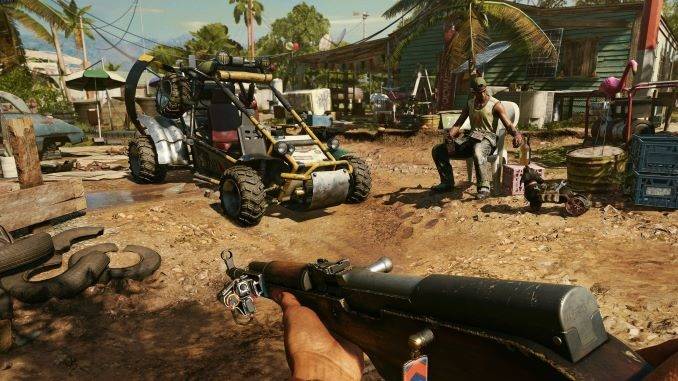The Exhausting Cynicism of Far Cry 6

There’s a new Far Cry out. There’s always a new Far Cry out. And even for a business as inherently cynical as entertainment, and as inherently cynical as big budget games, Far Cry is exceptionally cynical. What began as a tech showcase with a last-second, half-baked sci-fi story has become a biennial exercise in repetition, an endless cycle of the same chaos in a different jungle, the same appropriation of a different culture, the same game with just enough changes to give credulous preview writers something to fill their column inches with. Shoot, hunt, run through the jungle, all while trying to undermine a charismatic supervillain crafted out of cliches: it’s as formulaic as a Big Mac.
This year’s model puts you in a fake Cuba that’s also a fake Haiti, complete with a fake dictator played by a fake Latino. The Black and Italian actor Giancarlo Esposito, sleepwalking through his latest calm and collected villain routine, is Antón Castillo, a murderous tyrant who exploits the impoverished people of Yara. You play a guerilla superhero who joins up with the local revolutionaries and immediately becomes their most valued and important member. If you can credit Far Cry with anything other than its mechanically sound and enjoyable action, it’s the fact that the series ditched its white savior fixation after the atrocious Far Cry 3 and started focusing on characters from the countries and cultures found in the games. Dani, your hero here, is a native Yaran, either a man or a woman (your choice), whose goal is liberating the archipelago from under the boot of a cartoon sociopath.
Far Cry 6 is good at what Far Cry games usually do well. The physical and mental processes of playing it often achieve that elusive quality known as “fun.” Staking out an enemy fort, making a plan to sneak in undetected, getting found out halfway through, and successfully shooting your way out of the ensuing disaster accomplishes the bare minimum of what a game like this should accomplish; it can be exciting, it can be thrilling, it can give off a sensation of genuine risk, often followed by fear, frustration, or sometimes both. When you lose yourself in the action of Far Cry, it’s easy to forget all the parts of the game that don’t come together, or that are actively alienating.
Videogames that cost tens of millions of dollars to make typically aren’t a place to look for nuance. This has long been a key problem with Ubisoft games, including Far Cry; it adopts a veneer of real-world relevance for a sense of gravitas, and then stops far short of ever actually grappling with the issues and problems it co-opts. That’s as true as ever with Far Cry 6. The class differences and political backdrop to Yara’s culture are thinly sketched and barely explored, and most of its characters are stereotypes that exist solely to move the plot along. Nothing about Yara feels real, even as the game plays on real life pain and tragedy for an unearned sense of depth. Castillo nicely sums up the hole at the game’s core; despite his cool demeanor, Esposito’s corrupt dictator is as over-the-top in his cruelty as a comic book villain, and as cliched as any number of ‘80s action movie bad guys.
-

-

-

-

-

-

-

-

-

-

-

-

-

-

-

-

-

-

-

-

-

-

-

-

-

-

-

-

-

-

-

-

-

-

-

-

-

-

-

-








































